Phil Thrift – The Music Side
Ever since I can remember, I wanted to be a composer. Even before I knew anything about harmony or composition, I was studying musical scores – writing down all the notes that “fit together” – and composing pieces for my chromatic harmonica in the early 1970s. 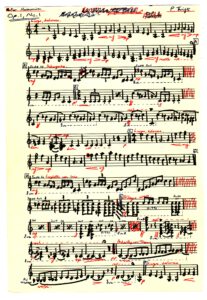
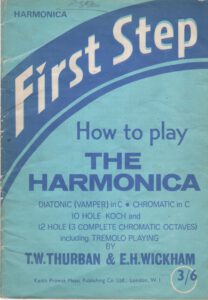 In those days I was playing in the school brass band conducted by Malcolm Smith. Initially on Eb tenor horn, later Bb baritone and, by the time I left school, Bb euphonium. In 1973 I was awarded the school music prize. Private practice time was Saturday mornings, which led to my mother shouting up the stairs to me, “Can’t you play a tune on that thing?” (To be fair, my parents did attend – and enjoy – all the concerts of the school brass band.) However, it is the memory of those rather uninspiring 2nd Eb tenor horn parts that has always motivated me to try to include something interesting at some point in every player’s part.
In those days I was playing in the school brass band conducted by Malcolm Smith. Initially on Eb tenor horn, later Bb baritone and, by the time I left school, Bb euphonium. In 1973 I was awarded the school music prize. Private practice time was Saturday mornings, which led to my mother shouting up the stairs to me, “Can’t you play a tune on that thing?” (To be fair, my parents did attend – and enjoy – all the concerts of the school brass band.) However, it is the memory of those rather uninspiring 2nd Eb tenor horn parts that has always motivated me to try to include something interesting at some point in every player’s part.
Funny how one decision can affect your whole life. When I left school at 16, I could choose between two job offers. The one I took later led to me working with Alan Ludlow, an architect and music-lover. I showed him a piece I had written for piano, which for him “looked like a proper piece of music”! So he took the initiative and sent it to the great English composer Alan Bush. (Many, many years later I used the melody of that piece for my Little Waltz for a Dancing Occasion.) Dr. Bush replied and suggested I should have composition lessons with a former pupil of his, Aubrey Bowman. That was 1978.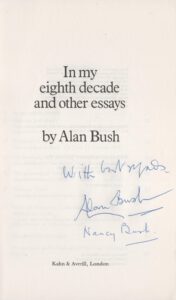
I spent the next six years travelling to north London every week for a lesson in composition with Aubrey. From time to time I took part in “composer evenings” in Notting Hill, where a few budding – and some more established – composers presented their latest works. Once, after singing one of my own songs, Dr. Bush commented wryly, “A very good setting of the words, but next time get a professional singer to sing it!” My move to Manchester put an end to regular lessons, but they laid the foundation for all my original compositions and arrangements since then.
One of the highlights of my composing life while in the North of England was writing the music for the musical Tin Hats ‘n’ Telegrams (original lyrics by Larry Aitken, Pat Aitken and Geoff Griffiths), a community production in New Mills. 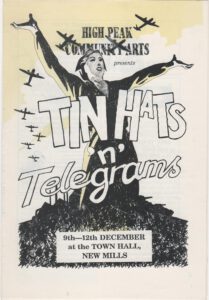 The musical score plus script for me to follow while conducting the band every night amounted to more than 200 pages!
The musical score plus script for me to follow while conducting the band every night amounted to more than 200 pages! 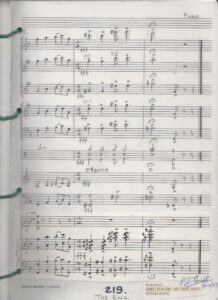 I had learned conducting with Aubrey as well, and over the years I had many opportunities to use what he had taught me. In those days I would get £5 for conducting a complete brass band concert!
I had learned conducting with Aubrey as well, and over the years I had many opportunities to use what he had taught me. In those days I would get £5 for conducting a complete brass band concert!
The world of music composition was a different one back then. Pencil on manuscript paper – and plenty of rubbing out! In the words of Aubrey Bowman, “If there are bars that don’t work, don’t try to make them work. Rub them out and start again.” Later, in the final copy, it would be ink on manuscript paper. Everything handwritten – all a far cry from today’s world of composition with a DAW and hundreds of instrumental samples at the composer’s disposal, and parts for the players generated automatically. Also different is the fact that now we all expect to listen to a good-quality audio file before purchasing music. In the old days, you were lucky if someone had an audio cassette or LP of a piece. In all other instances, you had to rely on your eyes to translate the music on the page into sounds in your head.
So, why didn’t I become a composer? I remember expressing that wish at school and being told that that was nonsense: Nobody is “just” a composer. I continued to compose and arrange in my spare time, had pieces performed – with moderate success. But there always seemed to be something else that had to be given priority: studies, work, later family. It was not until just a few years ago that I realised I should be giving this “nonsense” greater priority. This website is the result of that change of priority. I invite you to browse through the pieces I have on offer. They may not be to your taste, but they are all “properly composed”, with everything based on that grounding in composition that Aubrey Bowman gave me.
